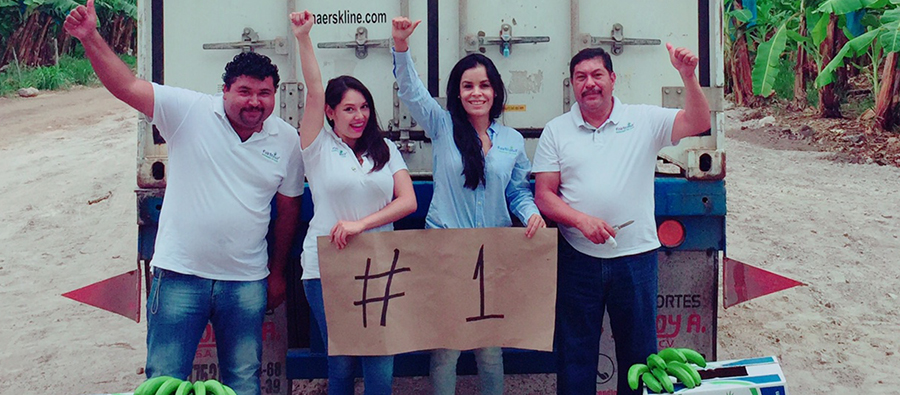In this guest post, Francis Mendez, Director of Fairtrasa Mexico explains the successful model her organisation uses to help small farmers in Mexico reach big markets.
In my home state of Michoacán, Mexico, many small-scale farmers struggle with poverty and lack of resources. While large agricultural companies and more advanced small-scale farmers are able to sell their products on international markets, many farmers remain marginalized. They lack the proper resources, know-how, and infrastructure to develop their farms and businesses. If they do sell their products, it is to local “middlemen” who pay them negligibly, if at all.
Since 2005, Fairtrasa Mexico (of which I’ve served as Director since 2011) has been dedicated to helping marginalized small-scale farmers empower themselves by producing and exporting certified produce. In almost every case, the farmers we work with have no experience in how to achieve certification for their produce, nor in exportation itself.
This means they are excluded from the benefits of being part of the global food supply chain, such as the ability to earn a significantly higher income than on local markets, and to re-invest this income in farm, business, and community development.
These farmers need help joining the global food supply chain in a sustainable way. At Fairtrasa Mexico, we give farmers the support, resources, and logistical help they need to become certified exporters. In essence, we helps them surmount trade barriers. This has been our model since our company was founded in 2005.
Our work is not easy. We exist in a region riddled with crime and violence. We operate on a for-profit business model, re-investing much of our profit in needy farmers. Our partner farmers have been burned by “outsider” companies in the past, so gaining their trust takes work and time.
Yet our model has been successful and impactful for twelve years, and I see several keys to that success.
International Certifications
For marginalized small-scale farmers, international certifications such as Organic, GlobalGAP, and GRASP are tickets to joining the global food supply chain, as they can be the key to fetching much higher prices – sometimes as high as 25-30% more. And the impact goes beyond the economic: by complying with international standards, farmers professionalize their operations and improve the environmental sustainability of their farms.
However, obtaining these certifications is difficult and costly for marginalized farmers. This is where Fairtrasa can help, by leading them through the application and compliance processes. In Mexico, we focus on helping farmers achieve organic certification for fruit, by carrying out on-farm analyses on their behalf and keeping track of administrative documents, at no cost to the farmer. In some cases, we cover most or all of the costs of certification. When they obtain and maintain these certifications, enormous market opportunities open to them.
Customized Training
Fairtrasa Mexico provides trainings tailored to the specific needs and development levels of our farmers. Our in-house agronomist performs a technical assessment for each farmer, and gives recommendations for optimizing production through sustainable techniques. He then provides or coordinates customized training workshops, and visits each farmer on his or her farm at least once a month. This training focuses on yield optimization, quality control, and meeting the certified standards.
Financial Support
Lack of financing is a huge barrier to many small-scale farmers. They simply do not have the financial resources to plant their fields, obtain certifications, and begin exporting. Fairtrasa Mexico addresses this issue mostly by giving small loans to farmers. In 2016, for example, we loaned a total of US$30,000 toward the costs of fertilizers, pruning, equipment, and staffing, among other aspects of the production and export processes.
Quality Before Quantity
While it’s vitally important to help small-scale farmers improve their yields and export volumes, it’s equally important to help them achieve professional-level quality control. Farmers need to produce consistently high-quality fruit in order to sell on international markets. Even a single bad avocado can lead a buyer to return a container of otherwise high-quality fruit—and a single rejected container can be devastating for upstart exporters. Over the last 12 years, Fairtrasa has learned that it’s essential for farmers to perfect their quality control before expanding their output for export. Patience and attention to detail are therefore extremely important.
Building Trust
Providing training, financing, and support to small-scale farmers is crucial. Yet there is something even more fundamental: the farmers’ trust in us. Many small-scale farmers have had bad experiences with fruit buyers in the past, who often made promises they didn’t keep. In my experience, these are the keys to gaining farmers’ trust:
- Keep your word: The society of our partner farmers is founded on the value of an individual’s word. If you don’t keep your word with farmers—even once—you will lose them. If you keep your word with farmers, you will begin gaining their trust. This is the essential groundwork for a building a long-term relationship.
- Locals for locals: Fairtrasa’s founder, Patrick Struebi, came to Mexico from Switzerland in 2005. Although he founded the company by gaining the trust of local, small-scale avocado growers, he immediately understood the importance of finding local leaders to lead our social enterprise. As Fairtrasa replicated its model in Peru, Chile, and the Dominican Republic, the principle has stayed the same. We are emotionally and practically invested in the farmers’ success.
- Demonstrate and lead by example: One of our team members is our in-house agronomist, Jose Luis Villagomez Solano, who is also a farmer in his own right. He owns a prosperous avocado farm where he utilizes sustainable techniques. When he visits our farmers and recommends best practices, he backs it up with his experience and output.
A Passionate Team
Underlying and fuelling our social enterprise is the passion and commitment of our team. Every day is a learning experience. Every day is a battle. But when we see the impact of helping marginalized small-scale farmers surmount trade barriers and thrive within the global food supply chain, it only makes us more passionate about the work we do.
This article originally appeared in WFO’s F@rmletter.



